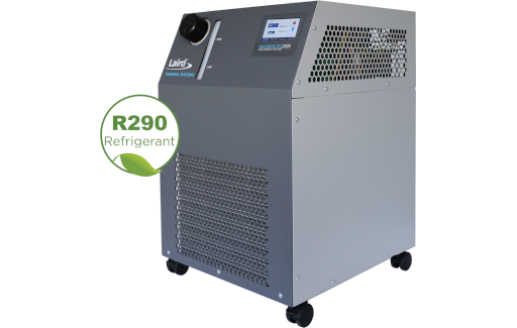Discover how our commitment to eco-friendly practices shapes the future of our thermal management solutions.
Our Product Director, Greg Ducharme (GD), sheds light on our journey towards sustainability, from refrigerant considerations to evolving compliance regulations, and the upcoming launch of our Eco-Friendly Chiller.
Can you tell us about the environmental considerations in developing our thermal management solutions?
GD: Absolutely, environmental consciousness is always considered in our product development. When it comes to designing refrigeration systems, we rely heavily upon how well the market of such components has been developed and our supply chain. When we began developing our new chiller product lines years ago, the market for low GWP or natural refrigerant components in the size we needed was still in development. As a step in the direction of using near 0 GWP refrigerants, we chose to use R513A.
How does incorporating R513A contribute to the environmental sustainability of our thermal management solutions?
GD: R513A is a mixture of R134a which is an HFC and R1234yf which is an HFO. Since R513A consists of more than half R1234yf which has a GWP of 4, the net effect is a GWP that is less than 50% of other common refrigerants. Furthermore, R513A is compatible with most components currently available on the market using R134a. These factors along with a comparable thermal performance, really made sense at the time when developing our Nextreme Performance and Value Series products.
How has the choice of refrigerant evolved recently with respect to compliance?
GD: The market has advanced significantly in recent years. Manufacturers have industrialized components that work with natural refrigerants and customers are beginning to accept the need to change. Additionally, compliance regulations are being proposed, manufacturers are pushing back on the timelines, and more realistic transition plans are being implemented. The topic is further complicated by the differing phases of implementation across the world. With that said, a good portion of the market has technical solutions for their refrigeration applications. Some challenges still exist, but they are being worked on.
Q: With our approaching Eco-Friendly Chiller (EFC) launch, why is now the time for customers to begin considering this type of product?
GD: The EFC product is our first standard product to use natural refrigerant. We have been in production for nearly 10 years with customer-specific solutions that use natural refrigerants. The EFC product uses R290, more commonly known as Propane, a Hydrocarbon refrigerant with a GWP of 3. The EU is set to ban the use of all fluorinated refrigerants by 2027. This is known as the F-gas regulation which impacts all products sold or produced within the EU. Other regions are not far behind, for example, the EPA regulations for North America, but the EU is leading the phase-down process.
Q: Some may have concerns about the safety of environmentally friendly refrigerants like R290. Can you shed light on the safety measures for the Nextreme Eco-Friendly Chiller?
GD:R290 is a flammable refrigerant, and advanced knowledge is required pertaining to system design and compliance. The system needs to be designed with a particular focus on what could happen if there is a leak. An example is isolating any components that could potentially cause a spark during operation. Smaller systems can be installed in enclosed spaces if it is certain that the refrigerant will readily dissipate within the space. Therefore, systems are designed with as little flammable refrigerant as possible.
The amount of flammable refrigerant also plays a role in how the product can be shipped. Since the amount of refrigerant charge is directly related to cooling capacity, this limits systems that can be charged and shipped via air to about 3kW.
Rigorous safety measures, including advanced leak detection systems and compliance with safety standards, are integral parts of our design to ensure user safety.
We also provide clear guidelines on installation, maintenance, and safety protocols to our customers.
As we move towards 100% compliance with products like the Eco-Friendly Chiller, do you have advice for companies that will have ongoing or future needs for recirculating chillers?
GD: The next few years are going to be critical for the portable chiller market. There is going to be a lot of development by manufacturers that are introducing new products and lot of users qualifying products. All this activity is going to stress the supply chain. The sooner companies start looking into available products for their application, the better. Soon it will no longer be about staying ahead of the curve, it will be about being non-compliant with industry regulations and not being able to place products on the market. It’s an exciting time in the refrigeration industry. Something the market knew was coming, just not when. Now we know and the time is now.

Related Products
Stay tuned for updates on thermal management industry regulations, new product releases, and innovative temperature control approaches with
LTS Thermal Solutions Spotlight:
Categories
Blog Date

